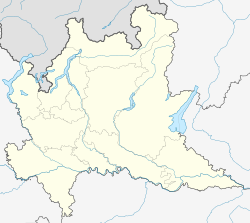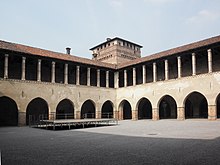Visconti Castle (Pandino)
hideThis article has multiple issues. Please help or discuss these issues on the talk page. (Learn how and when to remove these template messages)
|
| Castello Visconteo | |
|---|---|
| Pandino | |
 West wing with principal entrance Barbican on right, in front of East tower | |
 Castello Visconteo | |
| Coordinates | 45°24′20″N 9°33′15″E / 45.40556°N 9.55417°ECoordinates: 45°24′20″N 9°33′15″E / 45.40556°N 9.55417°E |
| Type | Medieval castle |
| Site history | |
| Built | 1355 |
| Built by | Bernabò Visconti |
The Castle of the Visconti in Pandino (Castello Visconteo di Pandino) is a Gothic-style castle located in the center of the town of Pandino, province of Cremona, region of Lombardy, Italy.
History[]

In 1355, Bernabò Visconti, Lord of Milan commissioned a castle at the site in part to have access to the then wooded surrounding hunting preserves. The castle is a quadrangle with corner towers and an internal courtyard with a hemming ground-floor portico with stout brick columns with peaked arches, and a second floor with denser simple columns. The exterior have single windows on the ground floor and mullioned peaked windows on the piano nobile. On the east wing, the ground floor had a second set of internal arches leading to a former banquet hall.

Overall, the castle has a rustic appearance. The interior retains some of the frescoed decoration, including painted architecture, and friezes that often included the symbols of the Visconti and of the family of Bernabò's wife, Regina Della Scala. Across from the entrance is the frescoed 16th-century .
The castle passed on to be property of the Sforza when Gian Galeazzo overthrew Bernabò Visconti. In the 15th century further defensive structures, including a barbican or gatehouse, and the taller east tower, were added to the castle. The castle was once surrounded by a moat.[1] None of these measures was to prevent the castle from falling into the hands of the Venetians a number of times.[2]
After the Sforza, the castle change hands a few times until in 1552, it became property of the Marchese D’Adda, and remained in this family's hands till the 19th century, the last private owners were the family of the Marchese D’Adda. The castle became largely dilapidated and was occupied for agricultural storage and workers.[3] In 1947, it was purchased and restored by the commune which utilizes part for school functions.
- Photographs by Paolo Monti

Tower from the East

Details of the windows

Frescos
References[]
- ^ Ville e castelli d'Italia: Lombardia e laghi, second edition, by Luca Beltrami, Editors of Tecnografica, Milan, (1907), page 429.
- ^ Comune of Pandino Archived 2015-09-19 at the Wayback Machine, entry on Castello.
- ^ Beltrami, page 428.
External links[]
- Buildings and structures completed in 1355
- Houses completed in the 14th century
- Castles in Lombardy
- Gothic architecture in Lombardy






